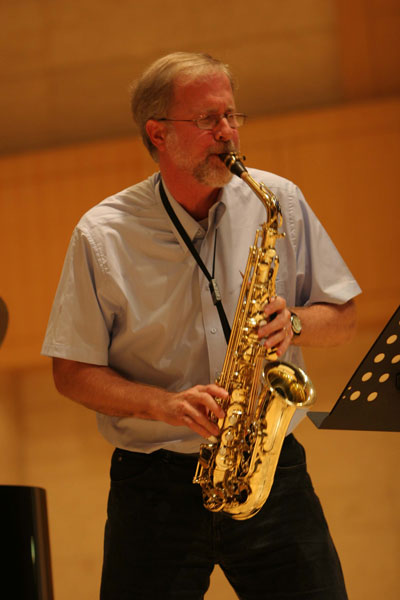Sometimes you just get lucky.
One day I received a phone call from
composer Jonathan Elliott. He had heard
a recording of the Master’s Degree recital that I had performed at Northwestern
University and he wanted to write me a piece. What do you say when a composer asks if he
can write you a piece? I was
thrilled.
Jonathan, a doctoral student at the University of Chicago
at the time, wanted to write a work for soprano saxophone and piano. Back then, I didn’t have a very useful
soprano. I managed to talk him into writing an
alto piece by telling him the alto had this great altissimo range. I was working on John Anthony Lennon’s Distances Within Me at the time and
truly believed that altissimo should be used, as Lennon seems to have done,
without regard for the fact that it can be difficult. So I told Elliott that the range of the alto
went to the altissimo F. I gave no other
qualifications. He decided to write the piece
for alto because he wanted to “use some of those low notes.”
Epiphany, as the composer states, is a piece written for
two virtuosos. Yes, the saxophone part is crazy difficult; but the piano part
is insane! I performed the piece in
Chicago a couple of times—once at the University of Chicago, and once at the New
Music Chicago festival. The piece
subsequently won an BMI composers award.
It is a very powerful piece of music.
I picked the piece up again to perform at the 1998
Biennial Conference of the North American Saxophone Alliance that I hosted on
the campus of Northwestern University. My goal in choosing music to perform
for other saxophonists, is to share new or neglected music that I’d like other
people to hear and want to perform themselves.
I had hoped that my colleagues would get to know this amazing piece of
music and choose to add it to their repertoire. I was
surprised by the reaction to Epiphany.
Many people praised the work, but seemed too terrified to take on such a
difficult piece.
A few years later, the composer did remove much of the
altissimo from the piece when other saxophonists suggested it was unplayable as
written. I still hear it in the higher range, and think it is more successful that way. If you want to work on the piece, contact me and I can let you know how to convert your score back to the original version.
In 1999 I received a grant to explore the composer-performer relationship. With this funding I was able to commission a new piece and travel to the World Saxophone Congress in Montreal for the premiere performance. Reflecting on the reactions at the 1998 NASA conference, I asked Jonathan Elliott to write an easier piece. My hope was that saxophonists would hear this piece and want to play it. Jonathan had moved to New York by this time and was reconsidering his compositional style. No one in New York would spend a year learning your music. So this project seemed to come at a good time.
The result of this collaboration was Jonathan Elliott’s Odd
Preludes, for saxophone and piano. I premiered the work at the WSC in 2000. You can hear it on my
recently-released album on the Centaur label, American Music for Saxophone and Piano.
Elliott wrote Field
Music: Ash for me in 2005 after I
asked him for a work for saxophone and cello. He decided to use the opportunity
to revisit and work through his feelings regarding the 9/11 terrorist
attacks of 2001. He lives in Brooklyn Heights, quite close to the World Trade Center. He witnessed the event up close which had a profound effect on him (and this piece). Elliott lost some
friends on that day and the creation of this work became part of his grieving
process. When he finally sent me the score, he admitted that writing it was one
of the most difficult things he had ever done.
Performances of this incredibly moving work are always
met with a strong emotional outpouring from the audience. At one concert in
Shanghai, China we were overwhelmed by the audience response. They stood, they clapped, they cheered, they
cried. Unbeknownst to us, our concert
had been scheduled on the second anniversary of a Chinese national tragedy (the
Great Sichuan Earthquake of 2008). Field
Music: Ash, written in response to an American national tragedy, touched
the hearts of the Chinese people that night in Shanghai.
You can hear Field Music: Ash on my new CD, Music for Saxophone and Cello, to be released in early 2012 on the Centaur label.
Works for saxophone by Jonathan Elliott:
Epiphany (1986), alto saxophone and piano
Six Motions (1992), alto saxophone and piano (originally, cl/pno)
Revolve, Seven Views (1994), alto saxophone and piano
Odd Preludes (2000), alto saxophone and piano
Friss (2001), alto saxophone and guitar (originally, fl/gtr)
Saxophone Quartet (2010)
Work in progress for saxophone ensemble (2012)
You can hear Field Music: Ash on my new CD, Music for Saxophone and Cello, to be released in early 2012 on the Centaur label.
Works for saxophone by Jonathan Elliott:
Epiphany (1986), alto saxophone and piano
Six Motions (1992), alto saxophone and piano (originally, cl/pno)
Revolve, Seven Views (1994), alto saxophone and piano
Odd Preludes (2000), alto saxophone and piano
Friss (2001), alto saxophone and guitar (originally, fl/gtr)
Saxophone Quartet (2010)
Work in progress for saxophone ensemble (2012)
Should you be interested in performing some of Elliott's music, you can find him at:
http://www.jonathanelliott.net/
je@jonathanelliott.net
http://www.jonathanelliott.net/
je@jonathanelliott.net




No comments:
Post a Comment